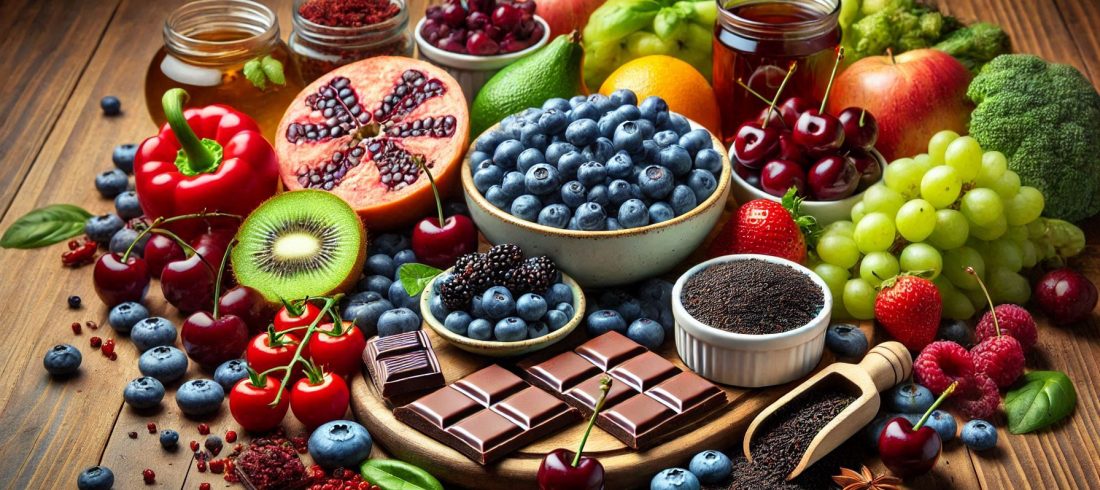Polyphenols: Nature’s Super Nutrients for Health and Vitality

Polyphenols are naturally occurring compounds found in plants that are celebrated for their wide-ranging health benefits. From promoting heart health to acting as potent antioxidants, polyphenols play a crucial role in maintaining overall well-being. This article dives into the science behind polyphenols, their benefits, and answers some of the most popular questions people have about them.
What Are Polyphenols?
Polyphenols are a category of plant compounds that are abundant in fruits, vegetables, tea, coffee, wine, and spices. They are classified into four main groups:
- Flavonoids: Found in fruits, vegetables, tea, and wine.
- Phenolic acids: Commonly present in coffee, fruits, and cereals.
- Stilbenes: Found in red wine and peanuts.
- Lignans: Found in seeds, particularly flaxseeds, and whole grains.
These compounds are known for their antioxidant properties, which help combat oxidative stress in the body.
Health Benefits of Polyphenols
1. Powerful Antioxidant Activity
Polyphenols neutralize free radicals that can damage cells, thereby reducing the risk of chronic diseases such as cancer and diabetes. For example, resveratrol, a type of stilbene, has shown promise in slowing the progression of certain cancers.
2. Cardiovascular Health
Polyphenols improve endothelial function and reduce blood pressure, lowering the risk of heart disease. A 2019 study published in Nutrients found that individuals consuming polyphenol-rich diets experienced significant cardiovascular benefits.
3. Anti-Inflammatory Properties
Chronic inflammation is a root cause of many diseases, including arthritis and metabolic disorders. Polyphenols, such as curcumin (found in turmeric), have been shown to reduce inflammation effectively.
4. Gut Health Improvement
Polyphenols act as prebiotics, promoting the growth of beneficial gut bacteria. They also inhibit harmful bacteria, contributing to better digestion and enhanced gut health.
5. Blood Sugar Regulation
Polyphenols improve insulin sensitivity and regulate blood sugar levels. Epigallocatechin gallate (EGCG) in green tea is particularly effective in managing blood sugar.
6. Skin Health
Polyphenols protect the skin from UV damage, improve elasticity, and reduce signs of aging. Many skincare products now incorporate polyphenols for their anti-aging benefits.
Popular Questions About Polyphenols
What Foods Are High in Polyphenols?
Some polyphenol-rich foods include:
- Fruits: Blueberries, apples, grapes, and cherries
- Vegetables: Spinach, onions, and broccoli
- Beverages: Green tea, black tea, coffee, and red wine
- Spices: Cloves, turmeric, and cinnamon
- Nuts and Seeds: Walnuts, almonds, and flaxseeds
Can Polyphenols Help with Weight Loss?
Yes, polyphenols may aid weight loss by boosting metabolism and enhancing fat oxidation. A study in Obesity Reviews suggested that polyphenol supplementation could be an effective strategy for weight management.
Are There Any Side Effects?
While generally safe, excessive consumption of polyphenols can lead to digestive issues such as bloating or diarrhea. Consult a healthcare provider before starting any new supplementation.
How Do Polyphenols Affect the Skin?
Polyphenols reduce oxidative stress and promote collagen production, leading to healthier, younger-looking skin. They also provide protection against harmful UV rays.
Do Polyphenols Interact with Medications?
Some polyphenols, such as those in grapefruit, can interfere with drug metabolism. Always consult a healthcare provider if you’re on medication.
Frequently Asked Questions from Search Data
1. What are polyphenols good for?
Polyphenols support heart health, reduce inflammation, regulate blood sugar, and improve gut health. They also have anti-cancer properties and protect the skin from damage.
2. Can polyphenols improve mental health?
Emerging studies suggest that polyphenols may help reduce symptoms of depression and anxiety by reducing oxidative stress and inflammation in the brain.
3. Which foods have the highest polyphenol content?
Cloves, dark chocolate, berries, and red wine are among the highest sources of polyphenols.
4. Do polyphenols lower blood sugar?
Yes, polyphenols enhance insulin sensitivity and improve glucose metabolism, making them beneficial for managing diabetes.
5. How many polyphenols should I consume daily?
While there is no specific recommended daily intake, a balanced diet rich in fruits, vegetables, and teas generally provides adequate amounts.
Incorporating Polyphenols into Your Diet
- Start Your Day with Green Tea: Replace coffee with green tea to enjoy the benefits of EGCG.
- Snack on Berries: Keep a mix of blueberries and cherries handy for a quick, nutritious snack.
- Spice Up Your Meals: Use turmeric, cinnamon, and cloves to enhance flavor and boost polyphenol content.
- Choose Dark Chocolate: Opt for chocolate with at least 70% cocoa for a healthy treat.
- Sip Red Wine in Moderation: Enjoy a glass occasionally to reap the benefits of resveratrol.
Conclusion
Polyphenols are a powerful addition to a healthy lifestyle. Whether through fruits, vegetables, teas, or supplements, incorporating polyphenols into your diet can lead vto significant health benefits. As always, consult with a healthcare professional for personalized advice.
References
- Scalbert, A., et al. (2005). “Polyphenols: Antioxidants and Beyond.” American Journal of Clinical Nutrition.
- Manach, C., et al. (2004). “Polyphenols: Food Sources and Bioavailability.” American Journal of Clinical Nutrition.
- Williamson, G., & Clifford, M. N. (2010). “Role of Polyphenols in Preventing Cardiovascular Diseases.” Journal of Nutrition.


